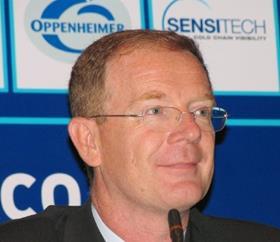
Pierre Pérès has been chairman of the Brazilian Apple Growers Association (ABPM) since 2004 and until last year also served as the chairman of the World Apple and Pear Association.
Fruitnet.com: How did you first get into the fresh produce business?
Pierre Pérès: It was in December 1985. I was leaving the US after three years of studying and working and heading back to France, when I received an invitation from my father-in-law to join his new apple company Pomagri in Fraiburgo, which is located in the Santa Catarina region of Brazil. He asked me if I would be interested in developing the business, and I seized the opportunity. Some 25 years later we are still in Fraiburgo, loving the work, the place, the people and the challenges.
When did you start working for ABPM?
PP: I was elected chairman of ABPM in 2004, and I have been re-elected twice since.
What were your first few years in the business like?
PP: When I moved to Brazil in 1985 I first had to submerge myself in the Brazilian way of life and learn to understand the apple business and the economics of the nation. At that time inflation was very high at 239.01 per cent, and it even rose to 2,489,11 per cent in 1992. Between 1985 and 1994 the average annual inflation rate was 1,003,15 per cent and the financial assets were indexed every day in order for the system not to collapse. This proved a fabulous learning experience and an education in survival. Then I had to deal with the language – fortunately it only took me three months to become fluent in Portuguese.
During that period of learning, I also planned the construction of facilities to store and sort apples at Pomagri. The first crop arrived in 1986 and one of the constructed depots was used to classify the fruit with a small FMC sorting machine we bought from a cooperative. Two years later the new buildings were completed. Exports came very soon afterwards. Then I added a new orientation to the business by setting up a trading division with the opening of a distribution centre in Belo Horizonte. Initially, this facility was mainly to sell our own production, but soon we were selling other kinds of fruits such as stonefruit. Finally, we began importing to complete the range of products and to offer to our clients a year-round supply of certain fruits.
What do you see as the biggest challenge facing the fresh produce industry?
PP: I believe the biggest challenges are the change in living habits; the permanent rush of day-to-day life; the feeling of not having enough time; and the shift in food consumption and cooking. Today, everybody knows that in order to be healthy they must eat at least five portions of fruits and vegetables every day. But looking at worldwide sales, we see a stagnation and even a reduction in the consumption of fruits and vegetables. To address this, we have to adapt to the way the people are eating – to offer them a solution in order to eat healthily and, at the same time, maintain value in the supply chain so suppliers can continue to make a living out of the business. Our sector is not communicating enough with consumers – we have left that up to the supermarkets.
Describe your typical day-to-day schedule?
PP: I start with a quick look at the economy news, and then have a meeting to review the production, buying, sales, exports and imports at Pomagri. On some days I visit the orchards or packhouses, and I go out for lunch with my wife, with whom I’ve shared my life for the last 30 years. In the afternoon, I attend more meetings with the company managers and concentrate on my emails. When necessary, I also do some work related to my position at ABPM.
What’s the first thing you do when you sit down at your desk?
PP: I review all the economy news and information regarding the apple industry that I’ve received in my inbox.
Do you prefer doing business over the phone or via email, or both?
PP: There is nothing that can substitute personal contact from time to time. After that, doing business by phone or email is a matter of personal convenience. At the end of the day, all decisions have to be recorded by a message, more often than not by email or, at times, in writing when an official document is required.
How many people are there on your team?
PP: I have the privilege to work directly with 14 wonderful people.
How much travelling is involved in your work?
PP: I spend around 20 per cent of my working life travelling.
Where have you been lately and where are you planning to go next?
PP: The last places I visited were Fruit Logistica in Berlin and São Paulo. My next trip will be to Brasilia and Belo Horizonte, which are both in Brazil.
What do you love in particular about your job and what, if anything, would you change?
PP: The produce business is a very competitive environment, which presents me with a lot of challenges to tackle. It also gives me the opportunity to live in a great environment right in the middle of Santa Catarina’s apple-producing region.
What do you do to unwind after a tough day at work?
PP: I spend one hour in the gym, and after a good shower I like to read, listen to music or watch the television. What’s most important for me is to relax, feel in good health and be with my family.



